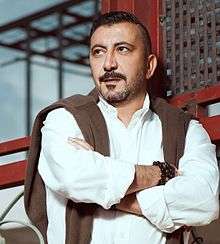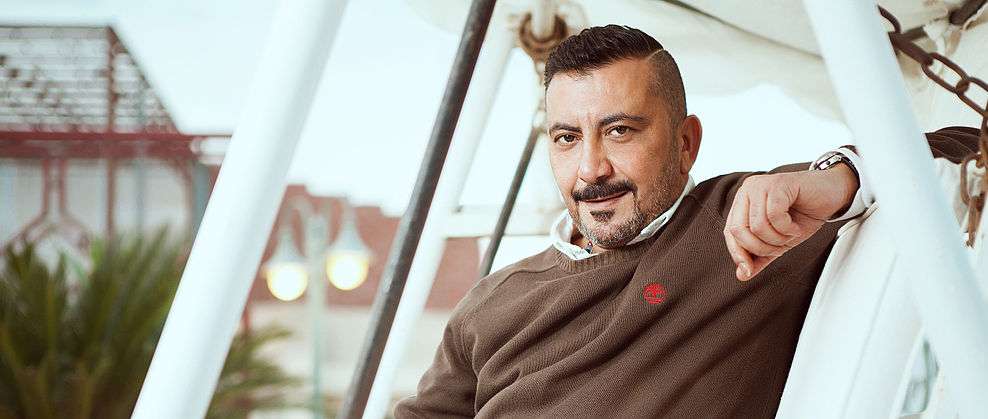Nasr Mahrous
| Nasr Mahrous | |
|---|---|
 Nasr Mahrous | |
| Born |
7 January 1969 Cairo, Egypt |
| Residence | Cairo, Egypt |
| Nationality | Egyptian |
| Occupation | Chairman of Free Music Art Production= Music Producer, Film producer, Director, Lyricist and Composer |
| Years active | 1989–present |
| Spouse(s) | Androulla Konstantinidou (9 March 2002–present) |
| Children | Victor, Peter, Antonius |
| Website | http://www.FreeMusicEg.com |
Nasr Mahrous Abdel Masih Tanious (born 7 January 1969) is an Egyptian music producer, best known for his Record label FreeMusic art production company. He is also known as a Star-Maker, Producer, Director, Lyricist and Composer.
Early life
Nasr Mahrous was born at home in Heliopolis, Cairo, the son of Mahrous Abdel Masih and Mathilda Botros. He is the second elder brother to three sisters, and two brothers Amir Mahrous and Hani Mahrous both sound engineers. Nasr was educated in a public school in Heliopolis.
He started at an early age in the world of music, working with his father who working in Cairo and surrounding villages with artists such as Mohamed Roshdy, Karem Mahmoud, Moharram Fouad and Mohamed Kandeel. Mr Mahrous has worked with female artists such as Nadia Mostafa, and Sabrine. He owns two recording studios (M-Sound 1 and M- Sound 2), which are run by his sons Amir Mahrous and Hani Mahrous.
He worked as a cassette distributor for the albums his father produced. His brother Amir Mahrous was working with him, they travelled from town to town and village to village all over Egypt distributing their Father's productions.
Father and son never stopped working together, they release albums produced by the father and labeled and distributed by FreeMusic.
FreeMusic Art Production
In the late 1980s, Nasr Mahrous began his own business after he discovered his passion for music and his ability to make a special style of Arabic music.

He founded his record company by the name of FreeMusic Art Production.
Amin Sami was the first singer discovered by Nasr, he signed with the company and released three successful albums.
Nasr rediscovered artists, wiped off the dust on some, polished the vocals of others and refreshed their talents, and helped them successfully go back to the top of the charts in new styles and looks.
He started with Samir Sroor who was in the 1970s one of the best saxophone players in the Arab world, he was a member of Al- Maseyah Band with the late singer Abdel Halim Hafez. Sroor stopped playing music for a time after the death of Abdel Halim Hafez in the late 1970s. Nasr Mahrous being a fan of Abdel Halim Hafez's art, he got in contact with Sroor and together they released five instrumental albums under the name (Ashek El-Sax) meaning Saxophone Lover. The albums includes instrumental pieces from Abdel Halim Hafez's most famous tracks.Khaled Agag is another example of a great masculine voice, but not great luck with record companies, until he met Nasr Mahrou. He released four successful albums with a few huge hits and a couple of video clips directed by Nasr Mahrous.
Mohammed Fouad was already a well known singer, but as he was working on his debut film Ismaeleya Rayeh Gaay he met Nasr Mahrous who was producing its soundtrack album Kamannana and that was the first album signed between them. Both film and soundtrack were a success, so the artist and the producer released another album Elhob Elhaee'ee with a video clip of the song Elhob Elhaee'ee meaning "The True Love". It was filmed in a school (Collège de la Salle) with hundreds of youngsters singing about the true love of family members.
Mohamed Mohie was a young artist who released a couple of albums but was looking for a good production company to enhance his talent, so he joined the team of FreeMusic, and released two albums of which Nasr Mahrous directed three video clips of the hit songs.
In the 1980s, Nasr Mahrous was a fan of Mohamed Mouir who was a well known pop artist, but stayed quite far away from the music world for a long time. He signed under the label of FreeMusic in 2000 and released his first album (Fi Eshk Elbanat – In the love of girls), which was a success, and they both decided to go for another album (Albi Masaken shaabeya – My Heart is suburbs) and filmed the video clip of So, Ya So.
The Star Maker

Nasr Mahrous managed to make out of his name a trademark as a Star Maker, and his name now is always coupled with star making.
In the late 1990s, Nasr Mahrous started a series of compilations called Free Mix in which he released singles for each artist. In these compilations Nasr Mahrous discovered his own voice and sang two songs under a southern Egyptian nickname Hareedi, singing in a southern Egyptian accent.
Bahaa, Sultan was another talent, Nasr loved his voice and it was he who named him "Sultan", in the Arabic music world it means a Leader in singing. The single (Ehlef – Swear) was released in the first Free Mix compilation and was followed with a debut album in 1999 (Yalli Mashi – You who're Leaving) and another one in 2001 (Talat Da'aye'e – Three Minutes) and then (Oum Ou'af wenta betkalemni – Stand up when you talk to me), which became a funny slogan in the Arabic world. The latest album was (Kan Zaman – Once Upon a time) it included his hit single (Elwad Albo beyewga'oo – The Lad's heart aches).
In early 2002 Nasr Mahrous challenged the world with two of the most famous voices in the Arab World. He released his 3rd Free Mix album, but this time it had just two artists, the cassette's side A had Sherine and her hit (Ah Ya Leil- O Night) while Side B had Tamer Hosny with his (Habibi we Enta Ba'eed – Baby When You're Away). The two songs were released at the same time as video clips and were on top of the charts as soon as they were released.
Sherine the short haired girl next door reached stardom after releasing two of her most successful albums (Garh Tani – Another wound) and (Lazem A'eesh – I must Live). Nasr Mahrous also directed six other video clips. She was showered with offers from other music production companies so she broke the contract with Nasr Mahrous to change to another company in 2006.
The romantic young singer Tamer Hosni, released five albums (Hob – Love), (Enaya Bethebak- My Eyes love you), (ELganna Fi Beyotna – Paradis is in Our Houses), (Ya Bent El Eh- What a girl You are) and finally (Arrab Kaman- Get closer) – which was the soundtrack of Nasr Mahrous' debut film in directing Captain Hima starring Tamer Hosni in 2008. Tamer broke off the contract to go to another company that would give him the freedom to make his own style of music.
Nasr Mahrous released the first album made especially for youngsters under the name Free Baby; it included eight songs, four of them which were sung by a group of youngsters from the conservatoire of Cairo. The music video for the song (Baba Fen – Where's your Dad?) was directed by Nasr Mahrous. Nasr Mahrous was invited by many Arab TV shows to talk about the phenomenon of (Baba Fen?) and group of youngsters "Free Baby".
Hareedi came out again in the album to sing two songs (Heb Baba, Heb Mama -Love your Dad, love your Mom), which its video was directed and acted by Nasr Mahrous at the same time, the other song was (Old Hareedi), which was inspired by the international folklore song (Old McDonald's).
Free mix 4 was released in 2004 to test the waters of a couple new young singers. Souma is a female artist with an extraordinary voice, she sings in Opera Aida and took her first chance to become a pop artist through a duet song with Bahaa Sultan (Elli Fe Eini- what's in my eyes). She released her debut album in 2006 (Eib Alek – Shame on you).
Nasr Mahrous signed with Haitham Shaker a young man with a romantic voice, the company released for him (Garh El-nas – Hurting others).
In early 2010, Nasr Mahrous had a health collapse and was rushed to the hospital for emergency colostomy surgery, while lying in the hospital, he released the debut album of his new Star DIAB titled Elaaw, meaning "Boo", and about three months later, Nasr Mahrous headed to the hospital for a colostomy reversal surgery, and he did it aggain and while he was in the hospital he released another album for his star Souma titled Dah Habibi meaning "That's my Lover".
Nasr Mahrous decided to set back and monitor the musical production in the Arabic World during the events of the Egyptian Revolution between 2011 and 2014, and he only released four patriotic songs where he introduced three new artists, Nabil, Touba and Nagham.
Late 2015, Nasr Mahrous resumed his production work where he released couple of singles and video clips of his new artists Touba and Nabil. and early 2016 he released the album of his established star Souma titled Nadmana.
Awards and honors
| Year | Category | Award |
| 1999 | Best Video clip | The Fifth Radio & Television Cairo festival |
| 2004 | Best Egyptian video director for the video clip of “Damet limeen – Muḥammad Rushdi” | Video Clip Oscar - Egypt |
| 2005 | Honor and appreciation | Misr University for science & technology |
| 2005 | Best Star Maker | Nile TV |
| 2007 | Honor and appreciation | City Academy |
| 2010 | A Certificate for Lifetime achievements | Nogoum FM Music Award – Egypt |
| 2010 | Honor and appreciation | Charisma International Lounge |
| 2012 | Honor and appreciation | Middle East Music Award (MEMA) |
| 2013 | Best Musician | Middle East Music Award (MEMA) |
The TV Channel (Free TV)

Nasr Mahrous introduced to the WORLD via Nile Sat his Musical TV channel (FreeTV Egypt) in the Summer of 2015. Its main objective was to be the window to the Western & Liberal Arabic world combining different cultures through the language of entertainment, and to be a showcase of modern and classic Arabic & International Music blended together.
And today Free TV is rated on the top of the Musical channels in the Arab world, for providing a unique, outstanding and quality content of clips and programs, and creating awareness about new talents, songs and albums from all over the world in general, and the Arab world in particular.
The lyricist
Nasr Mahrous is a registered Lyricist and a Publisher member at the Société des auteurs, compositeurs et éditeurs de musique known as (SACEM) which is a French professional association that protects artists’ rights and distributing the rights to the original songwriters, composers, and music publishers.
The Director
| Artist | Video Clip |
| Nabil | 'Amil Eih |
| Souma | Nadmana
Hatrooh |
| Touba | Wahashouni |
| Nabil and Touba | Mennak li-llah |
| DIAB | Hob Darwishni
Ghammazat El 'Awoo Ash-Shahn Fasal Kolo Eido Fo’ |
| Mohamed Fouad | El-hob Elhaee'ee |
| Khaled Agag | Ta'alali
Wahdani |
| Khaled Agag & Mohamed Mounir | Leh Ya Donia |
| Mohamed Mohie | Leh Beyfakarouni |
| Mohamed Mounir | Ana Ba'sha Elbahr
So Ya So |
| Bahaa Sultan | Ya Tara
Oum Ou'af wenta betkalemni Elli Fe Eini ("'Duet with Soma'") Elwad Albo Be'yoga'o Kan Zaman |
| Sherine | Ah Ya Liel
Sabri Aleel Garh Tani Ma Betfrahsh Lazem A'eesh Ma Feesh Marra |
| Tamer Hosny | Habibi we Enta Ba'eed
Arrab Habibi Hodn Elghareeb Enaya Bethebak Heya Di |
| Mohamed Mohie | Leh Beyfakarooni
Dayman Ala Bali Aader we Te'melha |
| Hareedi (Nasr Mahrous) | Hibb Baba |
| Free Baby | Baba Fen |
| Hasan Al-Asmar | Motshakereen |
| Mohamed Roshdy | Damet Lemeen
Atr Elhaya |
Stars made their way through FreeMusic
- Amin Sami
- Samir Sorour
- Mohamed Fouad
- Hasan Al-Asmar
- Khaled Agag
- Mohamed Mounir
- Bahaa Sultan
- Sherine
- Tamer Hosny
- Souma
- Haitham Shaker
- DIAB
- Nabil
- Touba
- Nagham
Movie
- Captin Hima 25 June 2008
- Written and directed By Nasr Mahrous
- Scenario by Ahmed Abdelfattah
- Starring Tamer Hosny and Zeina
Folkloric songs
Nasr Mahrous has produced the following two songs:
- 2002 Free Baby
- Esk Barara (Egyptian Folklore) Free Baby
- El Weld Haridy (international folklore – Old McDonald's) Nasr Mahrous/Hareedi
Related links
- Official webSite
- FreeMusic Company's official website
- FreeMusic Company's official YouTube Channel
- Nasr Mahrous official FaceBook page
- FreeMusic Company official FaceBook page